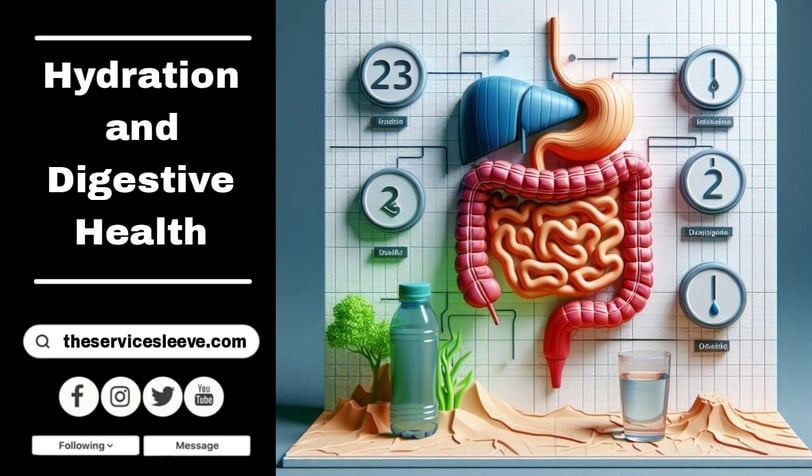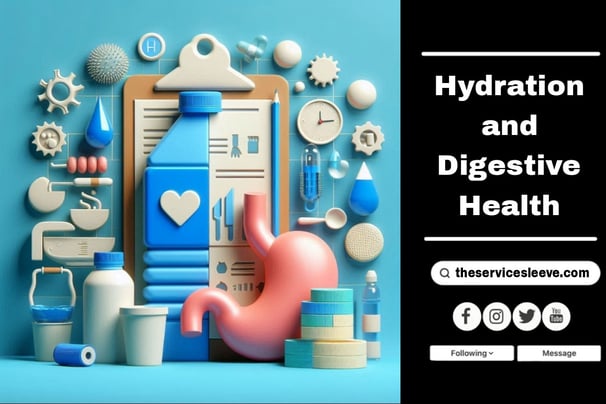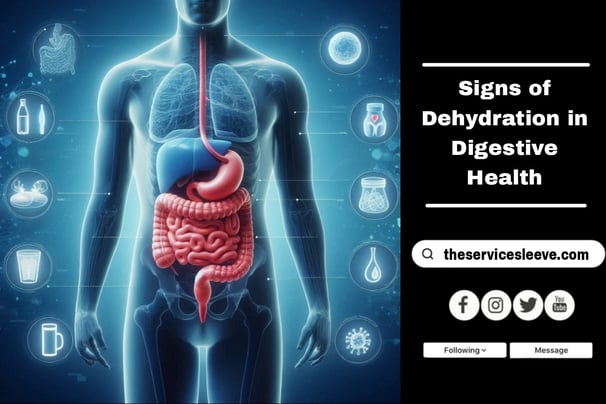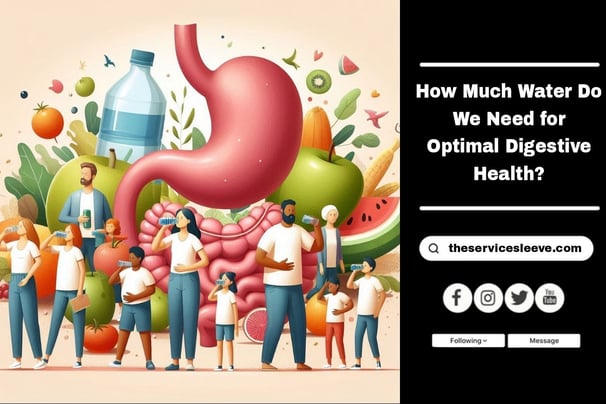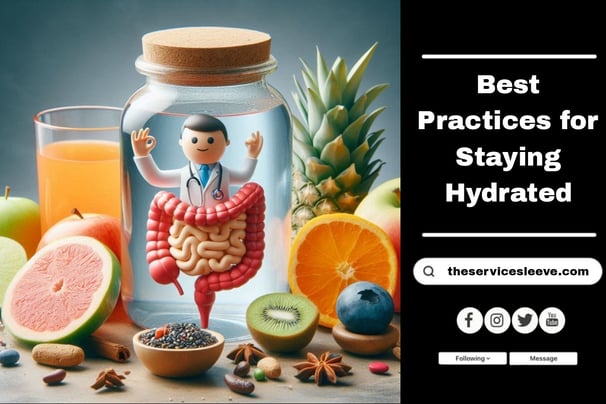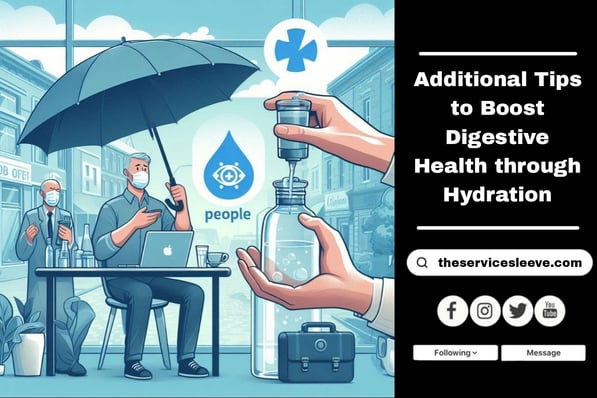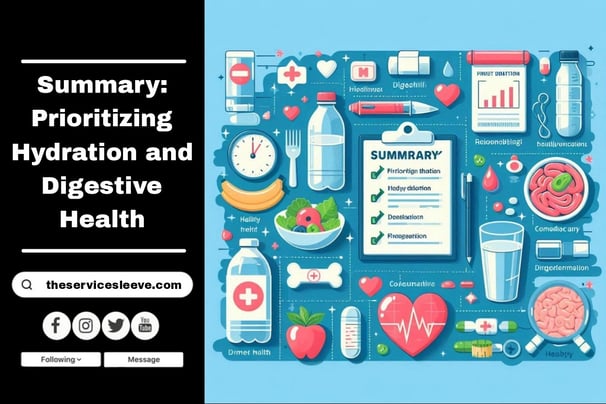Hydration and Digestive Health
Discover how hydration and digestive health work together to improve digestion, nutrient absorption, and overall wellness with tips for optimal water intake.
HYDRATION
Introduction to Hydration and Digestive Health
Staying properly hydrated is crucial for overall health, particularly for digestive health. There is a close relationship between hydration and digestive health; the digestive system cannot operate at its best without adequate water intake. Water is essential for the digestion of food, nutrient absorption, and waste removal processes. In short, maintaining proper hydration is critical to the smooth and effective functioning of the entire digestive process.
Hydration is necessary from the start in the digestive system. Saliva is formed with the aid of water during eating and starts to break down food to facilitate easier digestion. Proper hydration and digestive health are inextricably linked because the body relies on water to dissolve nutrients and allow them to be absorbed in the intestines. Water is also required to soften stool, which facilitates waste removal and avoids unpleasant conditions like constipation.
Concentrating on hydration can have a profound impact on people who are trying to enhance their digestive health. Frequent water consumption promotes all phases of digestion and lessens common problems like irregularity and bloating. Knowing the importance of hydration and digestive health enables us to make minor but significant changes to the amount of water we consume each day, maintaining the health and efficiency of our digestive systems.
Hydration and Digestive Health
Water is necessary for almost every step of the digestive process, as is evident when one considers the significance of hydration and digestive health. The body finds it difficult to generate the fluids required for proper food digestion, nutrient absorption, and waste removal when dehydrated.
Saliva Production:
Water is a primary component of saliva, the first step in the digestive process. Saliva not only begins to break down food as we chew, but it also contains enzymes that aid in the transformation of large food particles into a form that the stomach can easily digest. Consistent water consumption is essential for optimal hydration and digestive health because it ensures that enough saliva is produced to aid in digestion at every meal.
Absorption of Nutrients:
Water is extremely important in the small intestine, where the majority of nutrient absorption occurs. Water dissolves the nutrients in food as it passes through the intestines, enabling the body to absorb vitamins, minerals, and other vital substances. Proper hydration and digestive health work together here, as an adequately hydrated digestive tract helps nutrients move into the bloodstream more efficiently, fueling the body with what it needs.
Waste Removal:
Hydration is essential in the waste removal process. Water softens stool, which makes it easier to pass through the intestines and expel. Constipation and discomfort result from the colon absorbing too much water from the stool when there is insufficient water. Maintaining a clean and healthy digestive system depends on regular bowel movements, which are supported by maintaining digestive health and hydration.
There are observable advantages to paying attention to water intake for people who are concerned about maintaining optimal hydration and digestive health. Drinking enough water keeps the digestive tract functioning properly, which facilitates the body's smooth operation and enhances general health and wellbeing.
Signs of Dehydration in Digestive Health:
Maintaining ideal hydration and digestive health requires being aware of the symptoms of dehydration. The digestive system may suffer from anything from minor discomfort to long-term digestive problems if it doesn't get enough water. You can prioritize hydration and digestive health for improved wellness by being aware of the signs of dehydration associated with digestion.
Constipation:
Constipation is one of the most typical indicators that digestive health and hydration are out of balance. Stool must be softened with water in order to move easily through the intestines. Dehydration causes the colon to absorb more water from the waste, which can result in painful and challenging-to-expel hard, compacted stool.
Bloating and Gas:
Food can pass more slowly through the intestines when the digestive process is slowed down by dehydration. Gas and bloating are two unpleasant symptoms that may result from this slowdown. Because it encourages regularity and prevents the buildup of gas that frequently follows dehydration, staying hydrated supports digestive health.
Acid Reflux:
The ability of the stomach to control acids is also impacted by hydration. Heartburn or acid reflux symptoms may result from elevated stomach acid levels caused by dehydration. Proper hydration helps balance these acids, providing relief from these uncomfortable symptoms and promoting digestive health overall.
Digestive Discomfort and Cramping:
Maintaining intestinal mobility requires both digestive health and adequate hydration. Dehydration makes it more difficult for food to pass through the digestive tract effectively, which can cause cramping or other discomfort. This can be particularly noticeable after eating large meals, when the body requires additional water to process food.
You can preserve your digestive and hydration health by being aware of these symptoms and acting quickly. Drinking water on a regular basis helps to prevent these symptoms, keeps the digestive system functioning properly, and promotes overall health and wellness.
How Much Water Do We Need for Optimal Digestive Health?
Understanding how much water we require daily is critical for maintaining proper hydration and digestive function. Although each person has different hydration requirements, there are general rules to follow to keep your digestive system healthy. You can improve your digestive health and avoid dehydration-related problems by making regular water consumption a priority.
General Guidelines for Water Intake:
For most adults, health experts commonly recommend about eight 8-ounce glasses of water per day. However, this "8x8 rule" may vary based on factors like age, weight, and activity level. Following these basic guidelines is a good starting point, but for optimal hydration and digestive health, consider adjusting your intake based on personal needs.
Factors Affecting Water Requirements:
Body Size, Gender, and Age: Larger people or those with more muscle mass require more water to stay hydrated and digestively healthy. Similarly, men typically need more water than women, though personal factors will impact these needs. Click here to learn more about tailoring your family's water intake strategies based on their ages.
Physical Activity: People who regularly exercise or lead active lifestyles frequently require more water. Sweating during exercise causes fluid loss, which must be replaced to promote digestion and avoid digestive problems brought on by dehydration. Click here to read more about scheduling your water intake throughout the day as an athlete.
Climate and Environment: You might need to drink more water in hotter climates or during warmer months to stay hydrated and maintain digestive health. Similarly, people who live in cold climates should always remember to drink plenty of water because winter air can be dehydrating even if they don't feel thirsty. Click here to learn more about strategies for increasing your hydration levels during various seasons of the year.
Timing and Distribution of Water Intake:
Consider distributing your water intake throughout the day to maximize hydration and digestive health. Drinking water with meals aids digestion, but it is also important to drink water in between meals to stay hydrated without diluting stomach acids. Drinking a glass of water first thing in the morning can also help with digestion and set the tone for the rest of the day.
Click here to read more about scheduling your water intake throughout the day!
You can maintain optimal hydration and digestive health by tailoring your daily water intake according to these variables. Listening to your body's signals and being mindful of your water intake will help keep your digestive system running smoothly.
Best Practices for Staying Hydrated:
Sustaining digestive health and hydration requires regular hydration. You can attain digestive wellness more easily by using easy techniques to make sure you drink enough water throughout the day. You can maintain a healthy digestive system and incorporate hydration practices into your daily routine by adhering to these best practices.
Start Your Day with Water:
Drinking a glass of water first thing in the morning is a simple way to prioritize hydration and digestive health. This rehydrates your body after sleep, helps your digestive system get going, and gets your stomach ready for the day's meals. Maintaining a morning hydration routine can be particularly advantageous when combined with a healthy breakfast.
Drink Water before Meals:
Having a glass of water 30 minutes before a meal can help with digestion and prevent overeating. This practice enhances hydration and digestive health by preparing your digestive system to break down and absorb nutrients effectively. Avoid drinking too much water immediately after meals to maintain optimal stomach acidity for digestion.
Set Reminders to Drink Water Regularly:
Busy schedules can make it easy to forget about drinking water. Using a water-tracking app or setting reminders on your phone can be helpful for staying consistent with hydration. Regular reminders ensure that hydration and digestive health remain a priority throughout your day.
Include Hydrating Foods in Your Diet:
Fruits and vegetables like cucumbers, watermelon, oranges, and tomatoes have high water content and can supplement your hydration. These foods are a delicious way to boost hydration and digestive health, providing both water and additional nutrients to support your system.
Staying hydrated doesn’t have to be complicated. By adopting these best practices for hydration and digestive health, you can keep your digestive system running smoothly and maintain a sense of well-being throughout the day. Consistent hydration habits, paired with a reusable water container, can make all the difference in your daily health routine.
Additional Tips to Boost Digestive Health through Hydration:
Incorporating a few extra strategies into your routine can help optimize hydration and digestive health, ensuring your digestive system functions at its best. These additional tips can make it easier to stay hydrated while actively supporting digestion, from choosing nutrient-dense foods to timing your water intake effectively.
Pair Hydration with a Fiber-Rich Diet:
Combining hydration and digestive health with a diet high in fiber can improve digestive regularity because water and fiber support digestion. Whole grains, fruits, and vegetables are high in fiber because they hold onto water in the intestines, which softens stool and encourages regular bowel movements. This combination is essential for lowering common problems like bloating and constipation.
Incorporate Natural Hydration Boosters:
Herbal teas, coconut water, and infused water provide an enjoyable way to stay hydrated while adding variety. Peppermint or ginger tea, for example, can help soothe the digestive system, while coconut water offers electrolytes that support hydration and digestive health. Infused water with lemon, cucumber, or mint is refreshing and makes drinking water more enjoyable.
Use Water-Rich Foods as Hydration Support:
In addition to drinking water, consuming foods with high water content can significantly contribute to hydration and digestive health. Foods like cucumbers, celery, melons, and oranges provide both hydration and essential nutrients, helping keep the digestive tract well-lubricated and functional. Including these foods in your diet can be especially helpful during hot weather or when you're on the go.
Avoid Excessive Caffeine and Alcohol:
Both alcohol and caffeine can cause dehydration, which stresses the digestive system and compromises hydration and digestive health. Drink alcohol, coffee, and caffeinated sodas in moderation to maintain a balanced digestive system because these substances can accelerate water loss. Water or herbal tea can be used in place of these drinks to increase hydration and aid in digestion.
Set a Goal for Daily Hydration:
Setting a specific hydration goal can make a big difference in how much water you drink throughout the day. Strive to regularly reach this objective for improved hydration and digestive health. Using a refillable water container sleeve makes it convenient to carry water with you, helping you meet your hydration targets whether you’re at work, on a walk, or running errands.
These extra suggestions support a well-rounded strategy for staying hydrated in addition to hydration and digestive health. You can benefit from optimal hydration throughout the year and keep your digestive system in top shape by adopting these habits into your daily routine.
Summary: Prioritizing Hydration and Digestive Health
In summary, focusing on hydration and digestive health is essential for keeping your body functioning smoothly and efficiently. Water is an essential component of the digestive process, helping with everything from regular waste removal to nutrient absorption and saliva production. A well-balanced digestive system can be achieved by identifying the symptoms of dehydration, establishing realistic hydration goals, and including foods high in water in your diet.
Simple changes like drinking a glass of water first thing in the morning, drinking before meals, and carrying a reusable water bottle can have a big impact on supporting digestive health and hydration. Adopting these habits provides your digestive system with the hydration it needs, helping you avoid common digestive issues such as constipation, acid reflux, and bloating.
Prioritizing hydration is an investment in your general health. Focusing on hydration and digestive health results in a healthier, happier digestive system, whether through mindful hydration practices, fiber-rich foods, or regular water intake.
………………………….......................................………………..END OF THE ARTICLE……………,.............................................………………………..
